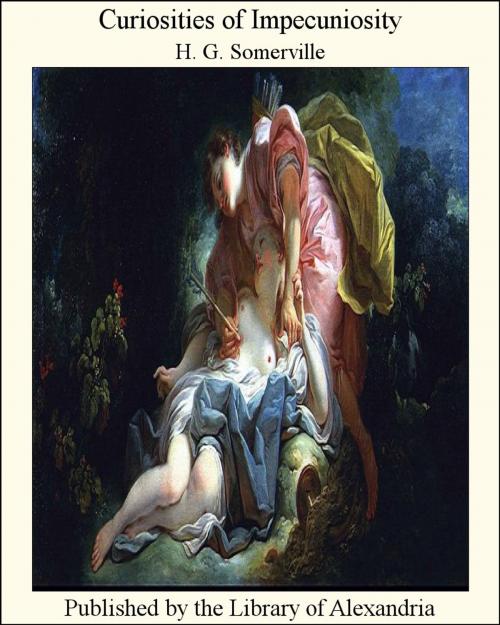Curiosities of Impecuniosity
Nonfiction, Religion & Spirituality, New Age, History, Fiction & Literature| Author: | H. G. Somerville | ISBN: | 9781465519801 |
| Publisher: | Library of Alexandria | Publication: | March 8, 2015 |
| Imprint: | Language: | English |
| Author: | H. G. Somerville |
| ISBN: | 9781465519801 |
| Publisher: | Library of Alexandria |
| Publication: | March 8, 2015 |
| Imprint: | |
| Language: | English |
THE MORAL AND IMMORAL EFFECTS OF IMPECUNIOSITY. “I wish the good old times would come again, when we were not quite so rich,” says Bridget Elia. “I am sure we were a great deal happier. A purchase is but a purchase now that you have money enough. Formerly it used to be a triumph. When we coveted a cheap luxury, we were used to have a debate two or three days before, and to weigh the for and against, and think what we might spare it out of, and what savings we could hit upon that would be an equivalent. A thing was worth buying then, when we felt the money we paid for it. Do you remember the brown suit which you made to hang upon you, it grew so threadbare, and all because of that folio Beaumont and Fletcher which you dragged home late at night from Barker’s in Covent Garden? Do you remember how we eyed it for weeks before we could make up our minds to the purchase, and had not come to a determination till it was near ten o’clock on the Saturday night, when you set off from Islington, fearing you should be too late; and when the old bookseller with some grumbling opened his shop, and by the twinkling taper lighted out the relic from his dusty treasure-house, and when you lugged it home wishing it were twice as cumbersome, and when you presented it to me, and when we were exploring the perfection of it, and while I was repairing some of the loose leaves with paste, which your impatience would not suffer to be left till daybreak, was there no pleasure in being a poor man? Do you remember our pleasant walks to Enfield, and Potter’s Bar, and Waltham, when we had a holiday? Holidays and all Other fun are gone now we are rich,—and the little hand-basket in which I used to deposit our day’s fare of savoury cold lamb, and how you would pry about at noontide for some decent house where we might go in and produce our store, only paying for the ale that you must call for, and speculate upon the looks of the landlady. We had cheerful looks for one another, and would eat our plain food savourily. You are too proud to see a play anywhere now but in the pit. Do you remember where it was we sat when we saw the ‘Battle of Hexham,’ and ‘The Surrender of Calais,’ and Bannister and Mrs. Bland in ‘The Children of the Wood,’ when we squeezed out our shillings apiece to sit three or four times in a season in the one shilling gallery? You used to say that the gallery was the best place for seeing, and was the best place of all for enjoying a play socially, that the company we met there, not being in general readers of plays, were obliged to attend the more. I appeal to you whether, as a woman, I met generally with less attention and accommodation than I have since in more expensive situations in the house. You cannot see, you say, in the gallery now. I am sure we saw—and heard too—well enough then; but sight and all, I think, is gone with our poverty.” But this is not the experience of every one. “Moralists,” Sydney Smith remarks, “tell you of the evils of wealth and station, and the happiness of poverty. I have been very poor the greater part of my life and have borne it, I believe, as well as most people; but I can safely say I have been happier for every guinea I have earned.” Doctor Johnson, in addition to alleging that “Poverty is a great enemy to human happiness; it certainly destroys liberty, and it makes some virtues impracticable and Others extremely difficult,” maintains that “poverty takes away so many means of doing good, and produces so much inability to resist evil, both natural and moral, that it is by all virtuous means to be avoided.” Burns is stronger still in his denunciation, exclaiming, “Poverty, thou half-sister of death, thou cousin-german of hell, where shall I find force of execration equal to the amplitude of thy demerits?” But in striking contrast to these, is that remarkable passage in George Sand’s ‘Consuelo,’ in which every known blessing and virtue is attributed to “the goddess—the good goddess—of poverty.” Samuel Smiles is of opinion that “nothing sharpens a man’s wits like poverty. Hence many of the greatest men have originally been poor men. Poverty often purifies and braces a man’s morals. To spirited people difficult tasks are usually the most delightful ones. If we may rely upon the testimony of history, men are brave, truthful, and magnanimous, not in proportion to their wealth, but in proportion to the smallness of their means
THE MORAL AND IMMORAL EFFECTS OF IMPECUNIOSITY. “I wish the good old times would come again, when we were not quite so rich,” says Bridget Elia. “I am sure we were a great deal happier. A purchase is but a purchase now that you have money enough. Formerly it used to be a triumph. When we coveted a cheap luxury, we were used to have a debate two or three days before, and to weigh the for and against, and think what we might spare it out of, and what savings we could hit upon that would be an equivalent. A thing was worth buying then, when we felt the money we paid for it. Do you remember the brown suit which you made to hang upon you, it grew so threadbare, and all because of that folio Beaumont and Fletcher which you dragged home late at night from Barker’s in Covent Garden? Do you remember how we eyed it for weeks before we could make up our minds to the purchase, and had not come to a determination till it was near ten o’clock on the Saturday night, when you set off from Islington, fearing you should be too late; and when the old bookseller with some grumbling opened his shop, and by the twinkling taper lighted out the relic from his dusty treasure-house, and when you lugged it home wishing it were twice as cumbersome, and when you presented it to me, and when we were exploring the perfection of it, and while I was repairing some of the loose leaves with paste, which your impatience would not suffer to be left till daybreak, was there no pleasure in being a poor man? Do you remember our pleasant walks to Enfield, and Potter’s Bar, and Waltham, when we had a holiday? Holidays and all Other fun are gone now we are rich,—and the little hand-basket in which I used to deposit our day’s fare of savoury cold lamb, and how you would pry about at noontide for some decent house where we might go in and produce our store, only paying for the ale that you must call for, and speculate upon the looks of the landlady. We had cheerful looks for one another, and would eat our plain food savourily. You are too proud to see a play anywhere now but in the pit. Do you remember where it was we sat when we saw the ‘Battle of Hexham,’ and ‘The Surrender of Calais,’ and Bannister and Mrs. Bland in ‘The Children of the Wood,’ when we squeezed out our shillings apiece to sit three or four times in a season in the one shilling gallery? You used to say that the gallery was the best place for seeing, and was the best place of all for enjoying a play socially, that the company we met there, not being in general readers of plays, were obliged to attend the more. I appeal to you whether, as a woman, I met generally with less attention and accommodation than I have since in more expensive situations in the house. You cannot see, you say, in the gallery now. I am sure we saw—and heard too—well enough then; but sight and all, I think, is gone with our poverty.” But this is not the experience of every one. “Moralists,” Sydney Smith remarks, “tell you of the evils of wealth and station, and the happiness of poverty. I have been very poor the greater part of my life and have borne it, I believe, as well as most people; but I can safely say I have been happier for every guinea I have earned.” Doctor Johnson, in addition to alleging that “Poverty is a great enemy to human happiness; it certainly destroys liberty, and it makes some virtues impracticable and Others extremely difficult,” maintains that “poverty takes away so many means of doing good, and produces so much inability to resist evil, both natural and moral, that it is by all virtuous means to be avoided.” Burns is stronger still in his denunciation, exclaiming, “Poverty, thou half-sister of death, thou cousin-german of hell, where shall I find force of execration equal to the amplitude of thy demerits?” But in striking contrast to these, is that remarkable passage in George Sand’s ‘Consuelo,’ in which every known blessing and virtue is attributed to “the goddess—the good goddess—of poverty.” Samuel Smiles is of opinion that “nothing sharpens a man’s wits like poverty. Hence many of the greatest men have originally been poor men. Poverty often purifies and braces a man’s morals. To spirited people difficult tasks are usually the most delightful ones. If we may rely upon the testimony of history, men are brave, truthful, and magnanimous, not in proportion to their wealth, but in proportion to the smallness of their means















